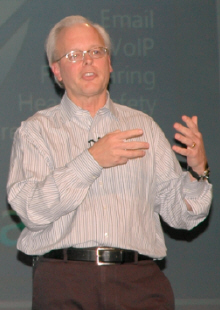Microsoft: Becoming a faster follower...again

The Gates and Ozzie memos don't shed much more light than what the two outlined at the rollout of Windows and Office Live on Nov. 1. Microsoft is behind again in understanding how the Web is transforming and disrupting the giants from the past century, just like ten years ago when Gates penned his Interent tidal wave memo, responding to Netscape's rising star.
Gates' memo, on Oct. 30, to executive staff, direct reports and distinguished engineeers, stated in corporate speak, fit for public consumption:
The next sea change is upon us. We must recognize this change as an opportunity to take our offerings to the next level, compete in a manner commensurate with our industry responsibilities, and utilize our assets and our broad reach to reshape our business for the benefit of the users of our products, our customers, our partners and ourselves.
The subtext is that Microsoft better get busy and not get hung up in antitrust issues to leverage its various software platforms in a Web 2.0, live world, including emulating and exceeding what Google and Yahoo have done.

Complexity kills. It sucks the life out of developers, it makes products difficult to plan, build and test, it introduces security challenges, and it causes end-user and administrator frustration. Moving forward, within all parts of the organization, each of us should ask “What’s different?”, and explore and embrace techniques to reduce complexity.
Ozzie goes on to say that Microsoft hasn't been leading the Web software transformation.
We should’ve been leaders with all our web properties in harnessing the potential of AJAX, following our pioneering work in OWA. We knew search would be important, but through Google’s focus they’ve gained a tremendously strong position. RSS is the internet’s answer to the notification scenarios we’ve discussed and worked on for some time, and is filling a role as ‘the UNIX pipe of the internet’ as people use it to connect data and systems in unanticipated ways. For all its tremendous innovation and its embracing of HTML and XML, Office is not yet the source of key web data formats – surely not to the level of PDF. While we’ve led with great capabilities in Messenger & Communicator, it was Skype, not us, who made VoIP broadly popular and created a new category. We have long understood the importance of mobile messaging scenarios and have made significant investment in device software, yet only now are we surpassing the Blackberry.
He cites Google and Yahoo for embracing new advertising, service and communication models; Apple for creating seamless user experiences; and the startups that treat the 'raw' Internet as their platform. The new mantra is for product managers to have a "services-enhanced software mindset," and to consider how to bake in services, new delivery and adoption models and ad-supported revenue models. Ozzie makes specific recommendations and poses core questions in his memo for the company divisions on his radar, such as eliminating tension between products designed for the enterprise and those for the Internet and whether to "extend or re-conceptualize Office modules to fit in this seamless model of connectedness to others, and to other applications."
Ozzie does his share of cheerleading in his memo, but he is clear that every Microsoft employee must "internalize the transformative and disruptive potential of services." For now Microsoft has to demonstrate its fast following prowess or be left watching Google, Yahoo and others speed even further ahead in the enabling and exploiting the Web as a platform.